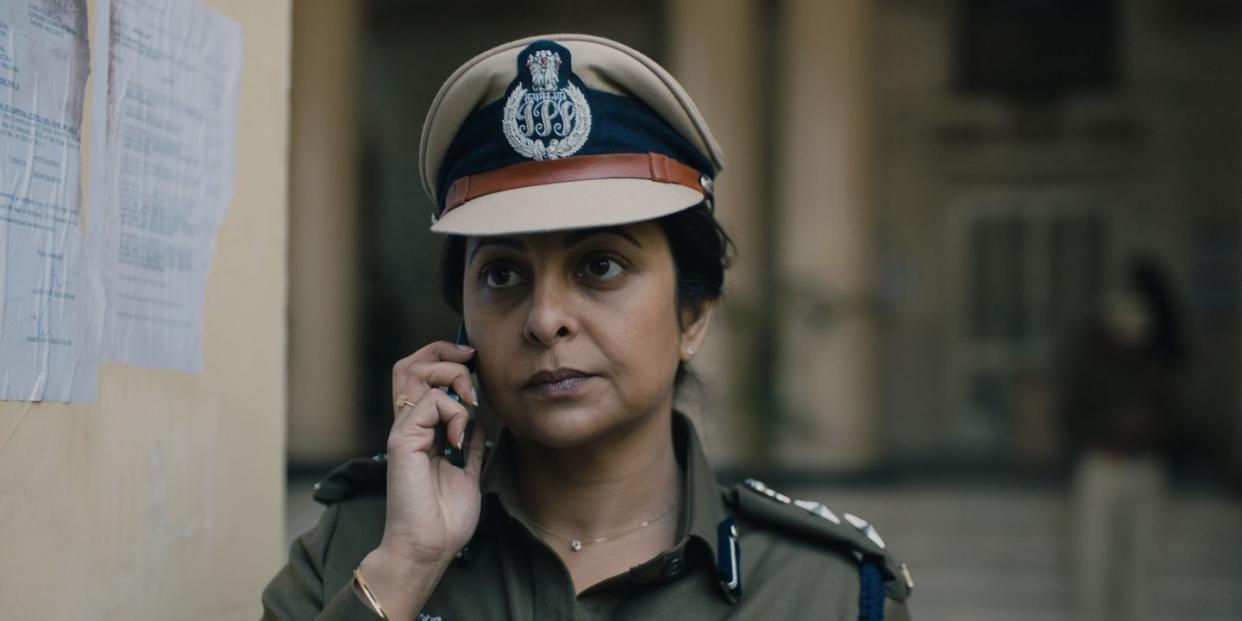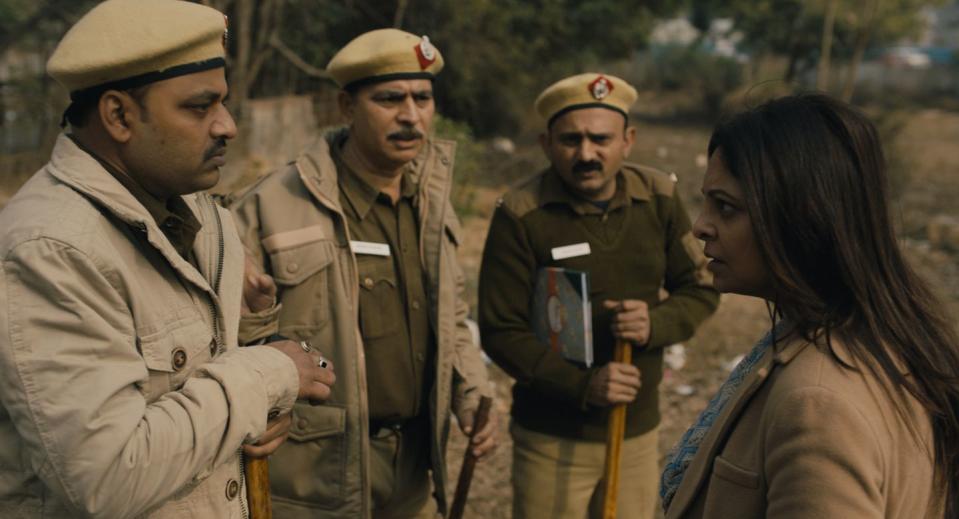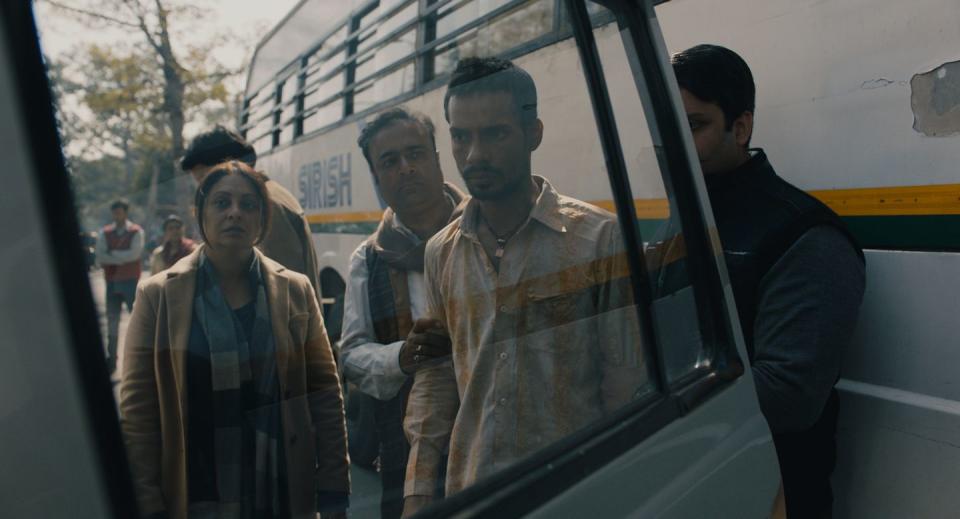The True Story Behind Netflix's 'Delhi Crime' is Absolutely Horrific

Netflix's latest foray into the world of true-crime narratives, Delhi Crime, is an extremely hard to watch and provocative portrayal of one of the most infamous rape case in recent history. The seven-part series centers around the 2012 police investigation of the brutal gang rape of a 23-year-old woman and the beating of her male friend. The case sparked passionate protests and a worldwide conversation about the ways in which India and many other countries protect women against sexual attacks.
The true story:
On December 16, 2012, medical student Jyoti Singh Pandey and her friend Awindra Pratap Pandey were heading home from seeing a movie. They boarded a bus that was reportedly off-duty, though it already had five other passengers, and the driver.
Awindra says he became nervous when the bus started taking a different route. The men on board shut off the lights, the bus stopped, and Awindra was brutally beaten and knocked unconscious with an iron rod. Jyoti was dragged to the back of the bus, and beaten with the same iron rod, while being sexually assaulted by those on board. Afterwards, Jyotie and Awindra were abandoned in the middle of the road, while the rapists attempted to clean up the evidence from the bus.
What happened after?
Jyoti had suffered serious wounds to her abdomen, intestines, and genitals. It's reported that she was also sodomized with the iron rod used in her beating. She underwent five surgeries, and was declared stable after the fifth, but was still considered in critical condition.
Following public outrage, the government and Indian prime minister, Manmohan Singh, were intent on making sure Jyoti received the best treatment possible. On December 26, during a cabinet meeting, it was decided that Jyoti should be transferred from her hospital in New Delhi to Mount Elizabeth Hospital in Singapore for further treatment.
During the six-hour flight, Jyoti reportedly suffered a cardiac arrest and never regained consciousness. On December 28, Jyoti's health continued to worsen and the doctors informed the press that she was suffering from severe brain damage, pneumonia, and infection. The next day, it was announced that Jyoti had passed away.
Initially, Jyoti's name was kept private due to sex-assault-victim privacy laws in India. She was referred to as “Nirbhaya,” meaning “fearless”. Her mother Asha Devi made her name public because she was “not ashamed” and wanted to de-stigmatize victims of sexual assault and their families.
Tell me about the investigation:
Less than 24 hours after the attack, the Delhi police used CCTV footage from the highway to locate bus driver Ram Singh. He was found and arrested in the same bus where the assault took place. Police located the others using sketches based on Awindra’s descriptions and texts sent from the victims’ stolen phones. Jyoti was only able to give statements through hand-gestures and multiple choice questions.
The five remaining suspects were all found quickly. Mukesh Singh, Pawan Gupta, Akshay Thakur, Vinay Sharma, and an unnamed 17-year-old were apprehended and the police found Jyoti's blood-stained clothes and the iron rod. Jyoti's bite marks were found on the suspects bodies, as she'd fought back against the men. The Nirbhaya Jyoti Trust was launched by her family in her honor, providing shelter and resources for victims of sexual violence.
What happened to the suspects?
Though the driver died in jail in March 2013 (Singh was found hanging in Tihar Jail where some believe he committed suicide, while other think he was murdered by inmates), the other perpetrators lived to face their crimes.
The four other adult defendants were convicted of rape, kidnapping, murder and destruction of evidence. They were sentenced to execution by hanging.
The unnamed minor was convicted of murder and rape. He was sentenced to three years in jail, the maximum sentence for juveniles. He was released in 2015 and is reportedly living under a new identity.
Still on death row, three of the convicted rapists filed for clemency with the Supreme Court in 2017. They were denied. Their lawyers are still fighting to have the death penalty lifted. However, Jyoti's parents are requesting their sentence be carried out as soon as possible.

Okay, what about the Netflix series?
The series focusses much more on the investigation and police than the brutal events on the bus.
Director Richie Mehta was initially against the idea of dramatizing this event, but was "amazed" by the manhunt. “ The verdict detailed the manhunt and who these people were and how they were found,” Mehta told the South China Morning Post. “I realized that this analysis of hunting these guys is also a way of understanding why these things happen.”

Mehta, who chose not to show the scene of the crime, gained permission to tell the story from the victim's family. “They completely understood what I was doing," he said. "I said if they wanted me to stop, I’d stop. They were very gracious but also recognized that something positive could come from this."
The story centers around two female officers, Vartika Chaturvedi (Shefali Shah) and Neeti Singh (Rasika Dugal), who Mehta repeatedly checked in with.
Delhi Crime was ordered by Netflix for two seasons. It will live as an anthology series, with season two taking on a completely different case.
('You Might Also Like',)


